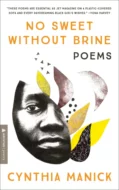 No Sweet Without Brine
No Sweet Without Brine
Cynthia Manick
HarperCollins
Reviewer: Erica Goss
“I want us living, not just alive,” Cynthia Manick writes in “Dear Future Body (Keep Your Skin Thickk),” a poem from her latest collection, No Sweet Without Brine. Body image, family, and the constant pressure to conform to others’ expectations inform the book, as the poet reveals not only what’s at stake for her but how she navigates a path through life’s constant complexities.
In “MTA Transit Exam Attempt #4,” she hears her father struggling to read a test form, “like his tongue are magpies / waiting to be trained.” If he passed the exam, he would qualify for a better job. His mortification over his difficulty reading is obvious:
When I step into the kitchen
he becomes a silent movie,
but there are no Black fathers
in silent movies.
To keep her father from feeling inferior, his daughter, bearer of “star-sticker reading charts, / and test score smiles,” conceals her academic gifts: “And I learn to hide / my shimmer … / thinking them Master tools / to be used only in secret.” These “Master tools,” as Manick names them with heartbreaking precision, could threaten the family’s stability. It’s safer, she decides, to simply avoid bringing them up.
Family secrets weave in and out of these poems, providing background and context. In “Pretending Is Like Breathing,” an aunt’s handwriting on a shopping list reveals her to be the one who once penned lines of desperation in a diary Manick found by accident as a young girl: “he’s with her again … sniffing her / coon shine … I just want what’s mine” and “my heart … the kids … we’ll have / no money.” Now she’s at the store with her niece, who notices the handwriting, and can’t focus on her aunt’s tales of “must haves” and “half-priced soup.” The poem ends as a plastic bag becomes a metaphor for keeping a lid on things:
Their flimsy bags too thin for a 2-liter
bottle of Coke and Gain detergent; her steady
fear of things spilling out.
Manick’s poems simmer with the pressure of unacknowledged hurts. The thoughtless comments of her gynecologist, of all people—“You should go on The Biggest Loser”—reverberate in “Dear Future Body (Keep Your Skin Thickk).” Manick, and all people with bodies that don’t conform to society’s expectations, must keep her skin thick in order to deflect comments such as these, which come at her constantly. “The implied real estate of— / don’t you want to be beautiful?” sends barbs, as well as “The Caucasity of a well-meaning / she has such a pretty face.”
The exhaustion inherent in these daily battles leads to a new reflection: “Dear Future Body, / take a break today”:
Remember to trace what remains,
the prayers your mouth learns.
I want us living, not just alive.
That last line is a statement in defiance of the constant pressure to conform, a burden Manick, as a Black woman, is acutely aware of.
The title of “When I Tell Our Story of Bees and Vinegar” echoes the sweet-brine contradiction of the book’s title. “I want to say / I don’t know how / to be charming on an elevator / or in any other place / where people avoid my eyes,” Manick writes, describing just one of the many casual, daily acts of racism she endures. Like “Dear Future Body,” this poem peels back the layers of hurt, revealing Manick’s inner monologue, thinking about “the destiny of my organs” or a birthmark inherited from an ancestor. As in “Pretending Is Like Breathing,” so much remains hidden; the poem ends with the lines “and all / the things we’re too scared to say.”
“B-Side Testimonials” stands in opposition to those unsaid things. Manick starts with “I want to testify,” a phrase she repeats throughout the poem. Beginning with some practical advice—“the aunties were right. They were right about having a spare $40 tucked in the rattiest bra you own,” Manick proceeds through self-care rituals (“don’t be afraid of the halo / your head can make”) to the poem’s pivot: “I want to testify that there ain’t no glory / in being quiet and dignified … I’m done with tasting elegies in my mouth.” Here, the poet uses these collected bits of wisdom, well-meant and heartfelt, to pull herself forward. She knows, at last, that the experiences of others light the way for her, and that she can pick and choose among them. “I see the future / unfolding like an old school card catalog,” she writes, “Each card smelling like a recipe or a version of home.”
Manick describes that vision of the future, with its fragrant cards pointing the way home, in “There Are No Unsacred Spaces.” Its first line, “I’m trying to tell you that—the world is beautiful,” could be a response to Maggie Smith’s now-ubiquitous poem, “Good Bones,” which ends with the wistful line, “You could make this place beautiful.” Manick, however, delights in the myriad small things that lead to happiness: “the grooves of the grin that know what to do,” “the tenderness of orcas,” “skin, and wonder, and touch.” The poem is a joyous list of sensual delights, unexpected and humorous, “like that dating app with welders and endangered / blacksmiths.” Here the poet distills her capacity for observation into a rollicking declaration that sails and swerves, eloquent but with an undercurrent of nostalgia for that beautiful world, which moves into the past even as we experience it.
Reading No Sweet Without Brine feels like a friend telling you an incredible story that happens to be true. Whether about a father struggling with literacy or the well-meant but slightly musty advice from elderly aunts, these poems pulse with vitality. Manick takes an unvarnished look at life with all of its hurts, challenges, and injustices, and sees much worth protecting.

